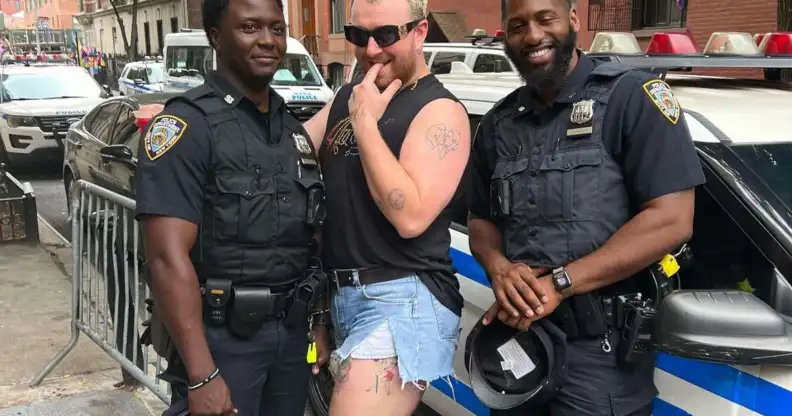Sam Smith posing with police is blatant ‘copaganda’. But be honest about your criticisms

Sam Smith posed with two NYPD police officers. (Instagram/Sam Smith)
Sam Smith posing with police officers is proof being trans doesn’t automatically bestow one with a radical politic. But criticise them for their politics, not their body, writes Jackson King.
Earlier this week, Sam Smith shared a picture of themself posing flirtatiously between two Black cops at NYC Pride – and it’s prompted fresh criticism of the singer, who’s already had to field a flurry of fatphobic comments in recent months.
The image in question – which speaks to issues of institutional police racism and homophobia, fetishisation of Black men, and assimilationism all at once – almost seems engineered to turbo-boost this year’s cycle of Pride discourse. Predictably, the replies to the post show a community divided between adoring fire emojis and “no cops at Pride” sentiments.
This isn’t the first time the Grammy-award-winning singer has indulged in “copaganda”. It’s unclear exactly when, but sometime around the spring of 2020, Smith took to Instagram to confess their crush on a “beautiful” policeman they’d met on a flight.
“Can’t stop day dreaming about what it would be like to be married to a sexy policeman and have beautiful little babies, and feel so safe in bed at night with my sexy policeman by my side,” they wrote.
This was posted before the death of George Floyd, and therefore before Black Lives Matter occupied any meaningful space in the consciousness of most white people.
One might have hoped for some reflection and growth from Smith during all the listening and learning that supposedly took place in the latter half of 2020, especially given the singer shared a “Justice for George” illustration shortly after the murder.
The conversations on police abolition, and the connections drawn between anti-Blackness and policing were hard to miss – even for the extremely apathetic and apolitical.
But three years on, Smith’s copaganda complicity shows no signs of abating. And while I don’t profess to know their intention or motivation, their love of lawmen seems more unapologetic than before: it feels a little pointed to go out of your way to be photographed with members of New York police department (NYPD), given that they’ve been banned from parading at NYC Pride until 2025.
Banned because the parade organisers recognise that “what the institution represents sometimes to a person of colour or trans person is violence”.
Whether considered or just thoughtless ignorance, Smith’s fondness for the police is proof that being trans doesn’t automatically bestow one with a radical or consistent politic. See: Caitlyn Jenner.
Of course, Smith isn’t unique in this respect. To borrow a phrase from Beyoncé, many white queers give “flip-flop, flippy, flip-floppin’-ass b*tch” when it comes to anti-racist solidarity. Monday, Black Lives Matter. Tuesday, White Oppressor Lives Matter – especially if the racist in question is “beautiful” or “sexy”.
But if anti-Black violence isn’t a boner-killer when it comes to lusting after cops, what about self-preservation?
It’s not just people of colour who’ve suffered at the hands of cops. The police have a long and well-documented history of anti-LGBTQ+ activity – and this is a history of which Smith is undoubtedly aware. In 2015 while on tour in Sydney, Australia, the singer left a show wearing a “sexy” NYPD outfit, inspired by George Michael’s “Outside” music video.
“Outside” was Michael’s comeback single after being arrested by an undercover police officer for engaging in a “lewd act” in a public toilet. Translation: he committed the crime of gay cruising.
While playful and upbeat, the 1998 video is ultimately about the looming spectre of the vice cop and the tacit criminalisation of gay sex.
Unfortunately, Smith either hasn’t connected – or doesn’t care to connect – the dots between Michael being arrested and why it might be inappropriate to create a Kodak moment with cops at Pride… even if you think they look hot.
‘Someone can be the target of undue hatred due to fatphobia, and simultaneously be complicit in a range of oppressive -isms themself’
In the resulting fallout from Smith’s Instagram post, I’ve seen some claim that any dislike of the musician has always been rooted in a dislike of their politics, rather than fatphobia. I find this difficult to believe, and think we need a dose of realism here: someone can be the target of undue hatred due to fatphobia and simultaneously be complicit in a range of oppressive “isms” themself.
In the same way that white queers can be blasé about racism, queers of all colours can be quite blasé about taking fatphobia seriously as a form of structural oppression.
Now that there’s a valid political reason to criticise the singer, some may be feeling emboldened or affirmed in a hatred that actually originated in the moment Smith put on weight.
So, by all means critique the singer, but be sure you’re doing so for their politics, not their body.
How did this story make you feel?

